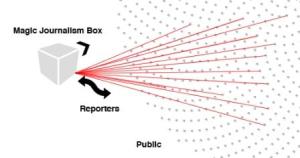Today’s article under review gives us new insights into how (badly?)science is communicated today (and was yesterday) with an analysis or comparison between science journalists and science bloggers- and the need all along for knowledge filters to separate nonsense from fact. As a personal aside (not mentioned in the article), nowhere is this more evident than in the “debate” about climate change and, to a lesser extent, on the poor air quality in many cities- the focus of this blog.


Key Quotes:
“Journalism is communication of 'what's new’”
“science is the process of discovery of facts about the way the world works, but the communication of that discovery is the essential last step of the scientific process, and the discoverer is likely to be the person who understands the discovery the best and is thus likely to be the person with the greatest expertise and authority (and hopefully ability) to do the explaining”
“For the longest time, information was exchanged [orally] between people who knew each other to some degree..communication could be done by anyone.... communication in print was limited to those who were literate and who could afford to have a book printed”
“at the close of the 20th century. journalism and science..completely separated from each other. Journalism covered what's new without providing the explanation and context for new readers just joining the topic. Science covered only explanation and only to one's peers.. unfortunately operating under the rules of journalism and not science, messing up the popular trust in both”
“reasons science bloggers are more trusted than journalists covering science:
- they have the scientific expertise that journalists lack - they really know what they are talking about on the topic of their expertise and the audience understands this.
- they link out to more, more diverse and more reliable sources.
- being digital natives, they are not familiar with the concept of word-limits…Whatever length it takes to give the subject what it's due.
- not being trained by j-schools, they never learned not to let their personality shine through their writing. So they gain trust by connecting to their readers - the phatic component of communication.
“Good science journalists are rare”
“Data journalism..what a number of forward-thinking journalists and media organizations are starting to do”
Related articles
- An informal chat about hard data (mindhacks.com)
- The line between science and journalism is getting blurry....again (scientificamerican.com)
- News Advisory and Embargo Policy Feed Rampant Speculation About Discovery of Extraterrestrial Life (bigthink.com)
- A Modest Proposal: Take "News" out of "Science News" (ionian-enchantment.blogspot.com)
- Evolution of a Science Journalist [Dean's Corner] (scienceblogs.com)
- Science Writers 2010: A Debate Over the Causes of Scientific Illiteracy and How Declining Science Journalism Fits Into That Picture | The Intersection (blogs.discovermagazine.com)
- The Value of Blogs (sandwalk.blogspot.com)
- Should science journalists take sides? | Not Exactly Rocket Science (blogs.discovermagazine.com)
- Employ science communicators? Want your science communication ... (scicommjobs.posterous.com)
- ScienceOnline 2011, here I come | Not Exactly Rocket Science (blogs.discovermagazine.com)

No comments:
Post a Comment